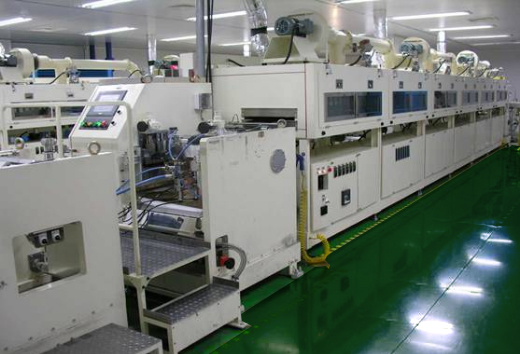Revolutionizing Medical Equipment with Lithium Battery Technology
In recent years, the advancements in lithium battery technology have revolutionized various industries, and the medical field is no exception. Lithium batteries have become the power source of choice for a wide range of medical devices due to their high energy density, long life span, and lightweight design. This article explores how lithium battery technology has transformed the medical equipment industry and improved patient care.
One of the primary advantages of using lithium batteries in medical equipment is their high energy density. Medical devices often require a significant amount of power to operate efficiently, and lithium batteries offer a compact and lightweight solution. This allows for the development of smaller and more portable devices, enhancing mobility and convenience for both healthcare professionals and patients. For instance, the advent of lithium battery-powered portable ultrasound machines has enabled healthcare providers to perform scans at the patient\’s bedside, reducing the need for transportation and improving the overall efficiency of medical care.
Furthermore, lithium batteries have a longer life span compared to traditional battery technologies. This is particularly crucial in the medical field, where devices need to operate consistently and reliably. The extended battery life provided by lithium batteries ensures that medical equipment remains functional for extended periods, reducing the need for frequent replacements or recharging. This not only saves time and resources but also enhances patient safety by minimizing the chances of device failure during critical procedures.
Lithium battery technology has also contributed to the development of more advanced and sophisticated medical equipment. The high energy density of lithium batteries enables the integration of additional features and functionalities into medical devices. For instance, implantable cardiac devices, such as pacemakers and defibrillators, have significantly benefited from lithium battery technology. These batteries offer long-lasting power to support continuous monitoring and ensure the timely delivery of therapeutic interventions when needed. This has greatly improved the quality of life for patients with cardiovascular conditions.
Moreover, the lightweight nature of lithium batteries has simplified the design and construction of wearable medical devices. These devices, such as fitness trackers and glucose monitors, require a power source that can be comfortably worn or attached to the body. Lithium batteries provide a lightweight and compact solution, allowing for the development of unobtrusive and user-friendly wearable devices. This promotes patient compliance and engagement in self-monitoring, leading to better management of chronic conditions and improved overall health outcomes.
In addition to these advancements, lithium battery technology also offers environmental benefits. Lithium batteries are rechargeable, reducing the need for single-use batteries that contribute to waste. Moreover, the improved energy efficiency of lithium batteries means that medical equipment can operate for longer periods, reducing overall power consumption and carbon emissions. These environmental considerations align with the growing global focus on sustainability and the adoption of greener practices in various industries, including healthcare.

Despite the numerous advantages of lithium battery technology, there are certain challenges that need to be addressed. The safety of lithium batteries, particularly in medical devices, is of utmost importance. Stringent regulations and guidelines are necessary to ensure the safe design, manufacturing, and use of these batteries in medical equipment. Additionally, the potential for battery failure and the need for proper disposal of lithium batteries at the end of their life cycle should be carefully managed to prevent any environmental and health hazards.
In conclusion, lithium battery technology has revolutionized the medical equipment industry and significantly improved patient care. The high energy density, long life span, and lightweight design of lithium batteries have enabled the development of smaller, portable, and more advanced medical devices. These advancements have enhanced mobility, convenience, and patient safety. Furthermore, the environmental benefits of lithium batteries align with the global focus on sustainability. Despite the challenges, the future of medical equipment lies in the continued innovation and integration of lithium battery technology.
-
 Every car owner will eventually face the task of replacing their car starter battery. Although it may seem daunting, it actually a simple process that can be done with the right tools and knowledge. This comprehensive guide will walk you through each step of the process, so you can replace your car starter battery with confidence. Step 1: Determine...続きを読む
Every car owner will eventually face the task of replacing their car starter battery. Although it may seem daunting, it actually a simple process that can be done with the right tools and knowledge. This comprehensive guide will walk you through each step of the process, so you can replace your car starter battery with confidence. Step 1: Determine...続きを読む -
 Introduction The world has witnessed a significant shift towards the use of advanced battery technology. This paradigm shift is commonly referred to as the Battery Industrial Revolution, which is transforming various industries and paving the way for a sustainable future. The advancements in battery technology have made it possible to power a wide range of applications, from electric vehicles...続きを読む
Introduction The world has witnessed a significant shift towards the use of advanced battery technology. This paradigm shift is commonly referred to as the Battery Industrial Revolution, which is transforming various industries and paving the way for a sustainable future. The advancements in battery technology have made it possible to power a wide range of applications, from electric vehicles...続きを読む -
 Introduction Lithium batteries are rechargeable batteries that are commonly used in portable electronic devices and electric vehicles. They are popular because they have a high energy density, meaning they can store a large amount of energy in a small volume or weight. This makes them ideal for use in portable devices that require a long-lasting battery. In this article,...続きを読む
Introduction Lithium batteries are rechargeable batteries that are commonly used in portable electronic devices and electric vehicles. They are popular because they have a high energy density, meaning they can store a large amount of energy in a small volume or weight. This makes them ideal for use in portable devices that require a long-lasting battery. In this article,...続きを読む -
 Where technological advancements are happening at an unprecedented rate, the need for efficient and reliable power sources has become paramount. One such power source that has revolutionized the way we live and work is the lithium-ion battery. This cutting-edge technology, with its high energy density, long cycle life, and lightweight design, has become the preferred choice for a wide range...続きを読む
Where technological advancements are happening at an unprecedented rate, the need for efficient and reliable power sources has become paramount. One such power source that has revolutionized the way we live and work is the lithium-ion battery. This cutting-edge technology, with its high energy density, long cycle life, and lightweight design, has become the preferred choice for a wide range...続きを読む -
 Introduction Batteries are an essential part of any vehicle. They provide the power needed for the engine to start, as well as for various electrical components in the car. Over the years, advancements in technology have led to the development of different types of batteries. One such type is the lithium starter battery, which has several advantages over traditional...続きを読む
Introduction Batteries are an essential part of any vehicle. They provide the power needed for the engine to start, as well as for various electrical components in the car. Over the years, advancements in technology have led to the development of different types of batteries. One such type is the lithium starter battery, which has several advantages over traditional...続きを読む -
 In this fast-paced world, where technology is evolving at an unprecedented rate, energy storage solutions have become a necessity. Whether it is for powering our homes, vehicles, or even our gadgets, we rely heavily on batteries. One such remarkable innovation is the high-capacity 12V LiFePO4 battery with 100Ah. This advanced battery technology has revolutionized the way we store and utilize...続きを読む
In this fast-paced world, where technology is evolving at an unprecedented rate, energy storage solutions have become a necessity. Whether it is for powering our homes, vehicles, or even our gadgets, we rely heavily on batteries. One such remarkable innovation is the high-capacity 12V LiFePO4 battery with 100Ah. This advanced battery technology has revolutionized the way we store and utilize...続きを読む -
 Golf carts are the backbone of the golf course, providing convenience to players and managers alike. Behind this, the stability and durability of golf cart batteries have become key factors to ensure smooth course operations. The stable and durable golf cart battery not only brings an efficient working experience to the golf course, but also allows users to save worry...続きを読む
Golf carts are the backbone of the golf course, providing convenience to players and managers alike. Behind this, the stability and durability of golf cart batteries have become key factors to ensure smooth course operations. The stable and durable golf cart battery not only brings an efficient working experience to the golf course, but also allows users to save worry...続きを読む

